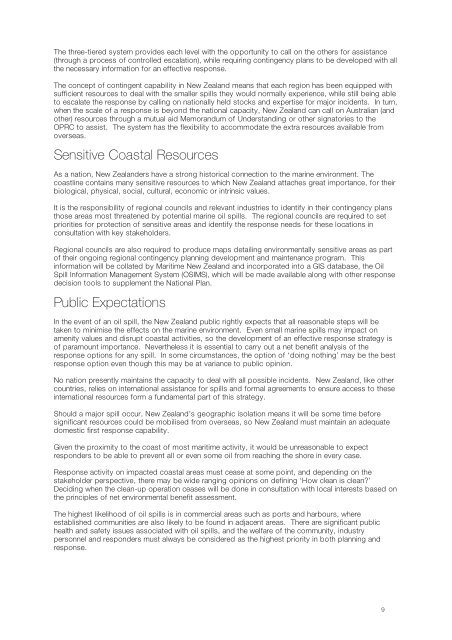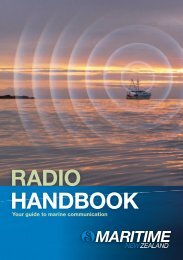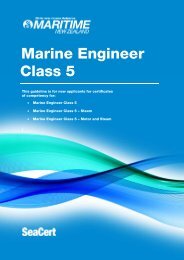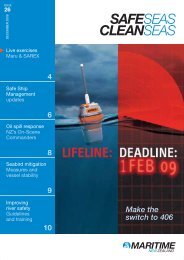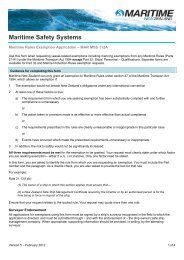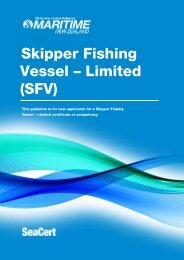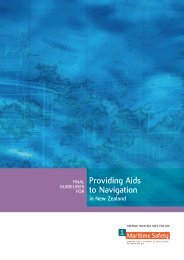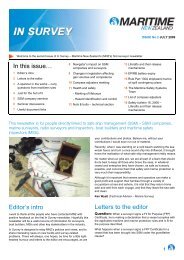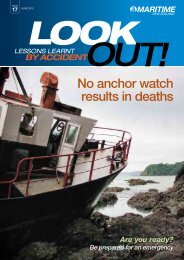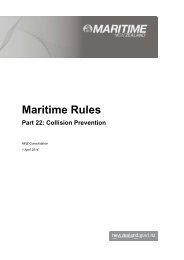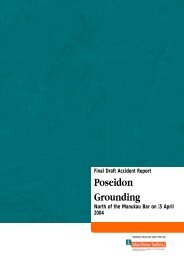New Zealand oil spill response strategy - Maritime New Zealand
New Zealand oil spill response strategy - Maritime New Zealand
New Zealand oil spill response strategy - Maritime New Zealand
Create successful ePaper yourself
Turn your PDF publications into a flip-book with our unique Google optimized e-Paper software.
The three-tiered system provides each level with the opportunity to call on the others for assistance<br />
(through a process of controlled escalation), while requiring contingency plans to be developed with all<br />
the necessary information for an effective <strong>response</strong>.<br />
The concept of contingent capability in <strong>New</strong> <strong>Zealand</strong> means that each region has been equipped with<br />
sufficient resources to deal with the smaller <strong>spill</strong>s they would normally experience, while still being able<br />
to escalate the <strong>response</strong> by calling on nationally held stocks and expertise for major incidents. In turn,<br />
when the scale of a <strong>response</strong> is beyond the national capacity, <strong>New</strong> <strong>Zealand</strong> can call on Australian (and<br />
other) resources through a mutual aid Memorandum of Understanding or other signatories to the<br />
OPRC to assist. The system has the flexibility to accommodate the extra resources available from<br />
overseas.<br />
Sensitive Coastal Resources<br />
As a nation, <strong>New</strong> <strong>Zealand</strong>ers have a strong historical connection to the marine environment. The<br />
coastline contains many sensitive resources to which <strong>New</strong> <strong>Zealand</strong> attaches great importance, for their<br />
biological, physical, social, cultural, economic or intrinsic values.<br />
It is the responsibility of regional councils and relevant industries to identify in their contingency plans<br />
those areas most threatened by potential marine <strong>oil</strong> <strong>spill</strong>s. The regional councils are required to set<br />
priorities for protection of sensitive areas and identify the <strong>response</strong> needs for these locations in<br />
consultation with key stakeholders.<br />
Regional councils are also required to produce maps detailing environmentally sensitive areas as part<br />
of their ongoing regional contingency planning development and maintenance program. This<br />
information will be collated by <strong>Maritime</strong> <strong>New</strong> <strong>Zealand</strong> and incorporated into a GIS database, the Oil<br />
Spill Information Management System (OSIMS), which will be made available along with other <strong>response</strong><br />
decision tools to supplement the National Plan.<br />
Public Expectations<br />
In the event of an <strong>oil</strong> <strong>spill</strong>, the <strong>New</strong> <strong>Zealand</strong> public rightly expects that all reasonable steps will be<br />
taken to minimise the effects on the marine environment. Even small marine <strong>spill</strong>s may impact on<br />
amenity values and disrupt coastal activities, so the development of an effective <strong>response</strong> <strong>strategy</strong> is<br />
of paramount importance. Nevertheless it is essential to carry out a net benefit analysis of the<br />
<strong>response</strong> options for any <strong>spill</strong>. In some circumstances, the option of ‘doing nothing’ may be the best<br />
<strong>response</strong> option even though this may be at variance to public opinion.<br />
No nation presently maintains the capacity to deal with all possible incidents. <strong>New</strong> <strong>Zealand</strong>, like other<br />
countries, relies on international assistance for <strong>spill</strong>s and formal agreements to ensure access to these<br />
international resources form a fundamental part of this <strong>strategy</strong>.<br />
Should a major <strong>spill</strong> occur, <strong>New</strong> <strong>Zealand</strong>’s geographic isolation means it will be some time before<br />
significant resources could be mobilised from overseas, so <strong>New</strong> <strong>Zealand</strong> must maintain an adequate<br />
domestic first <strong>response</strong> capability.<br />
Given the proximity to the coast of most maritime activity, it would be unreasonable to expect<br />
responders to be able to prevent all or even some <strong>oil</strong> from reaching the shore in every case.<br />
Response activity on impacted coastal areas must cease at some point, and depending on the<br />
stakeholder perspective, there may be wide ranging opinions on defining ‘How clean is clean?’<br />
Deciding when the clean-up operation ceases will be done in consultation with local interests based on<br />
the principles of net environmental benefit assessment.<br />
The highest likelihood of <strong>oil</strong> <strong>spill</strong>s is in commercial areas such as ports and harbours, where<br />
established communities are also likely to be found in adjacent areas. There are significant public<br />
health and safety issues associated with <strong>oil</strong> <strong>spill</strong>s, and the welfare of the community, industry<br />
personnel and responders must always be considered as the highest priority in both planning and<br />
<strong>response</strong>.<br />
9


